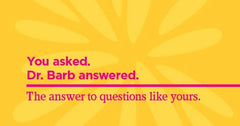 You describe hot flashes and night sweats that began after a hysterectomy to reduce breast cancer risk. You're right that the symptoms can be prompted by your sudden entry into menopause (through surgery) as well as by the prescriptions intended to deplete estrogen in your system. You are, as you know, not alone in facing this challenge!
You describe hot flashes and night sweats that began after a hysterectomy to reduce breast cancer risk. You're right that the symptoms can be prompted by your sudden entry into menopause (through surgery) as well as by the prescriptions intended to deplete estrogen in your system. You are, as you know, not alone in facing this challenge!
I always start with lifestyle factors, which can lessen symptoms for anyone. You may be able to identify triggers (like caffeine, alcohol, spicy foods, or sugar) that you can avoid in your diet. Dressing in layers is a must for many of us. Now is the time to exercise regularly; women who do so may have fewer and/or less intense hot flashes.
Reducing stress—or learning new tactics to manage it—is helpful if you can do it (I know life doesn't always cooperate). Paced respiration is a technique to ease the intensity of a hot flash when one occurs: Breathe deeply and slowly, inhaling through your nose and exhaling slowly through your nose or mouth. There's also a biofeedback technique to slow the heart rate, which may lessen the hot flash intensity and duration (because an elevation of heart rate is part of the physiology of a hot flash).
Acupuncture has been very helpful to a number of my breast cancer patients in managing hot flashes.
Beyond that, we haven't seen a lot of success with alternative medications and complementary therapies. Those that have been tried include isoflavones (found in soy but not recommended for breast cancer patients), black cohosh, chaste tree berry, ginseng, dong quay, red clover, yarrow and others. For those that have been investigated and undergone careful scrutiny, the results are disappointing; there is limited scientific evidence for most herbal options. That being said, placebo has at least a 25 to 40 percent response rate in nearly every study, so if you can determine that an herb is not harmful (check with your physician) I do not discourage women from trying herbal preparations. I wish we could make a recommendation knowing we are in fact offering beneficial outcomes, but that just hasn’t been so for these options.
There are some non-hormone prescription options that have favorable effects. Just in the past year the FDA approved Brisdelle specifically for the treatment of hot flashes. It cannot be used with Tamoxifen, but as a very, very low dose of paroxitene (generic for Paxil), Brisdelle is well tolerated with minimal side effects. The anti-hypertensive medication clonidine has been shown to reduce hot flashes for some women, as well as gabapentin (generic for Neurontin). Other antidepressants can reduce hot flashes as well: venlafaxine (generic for Effexor), paroxetine, and fluoxitene (generic for Prozac), and escitalopram (generic for Lexapro). All of these have a modest benefit to hot flashes. They each have the potential of side effects, so a discussion with your provider is helpful in determining an option best suited for you.
Good luck, and the good news is that time will work to your advantage for the hot flashes. This too shall pass—really!
 Dr. Barb DePree, M.D., has been a gynecologist and women’s health provider for almost 30 years and a menopause care specialist for the past ten.
Dr. Barb DePree, M.D., has been a gynecologist and women’s health provider for almost 30 years and a menopause care specialist for the past ten.


0 comments